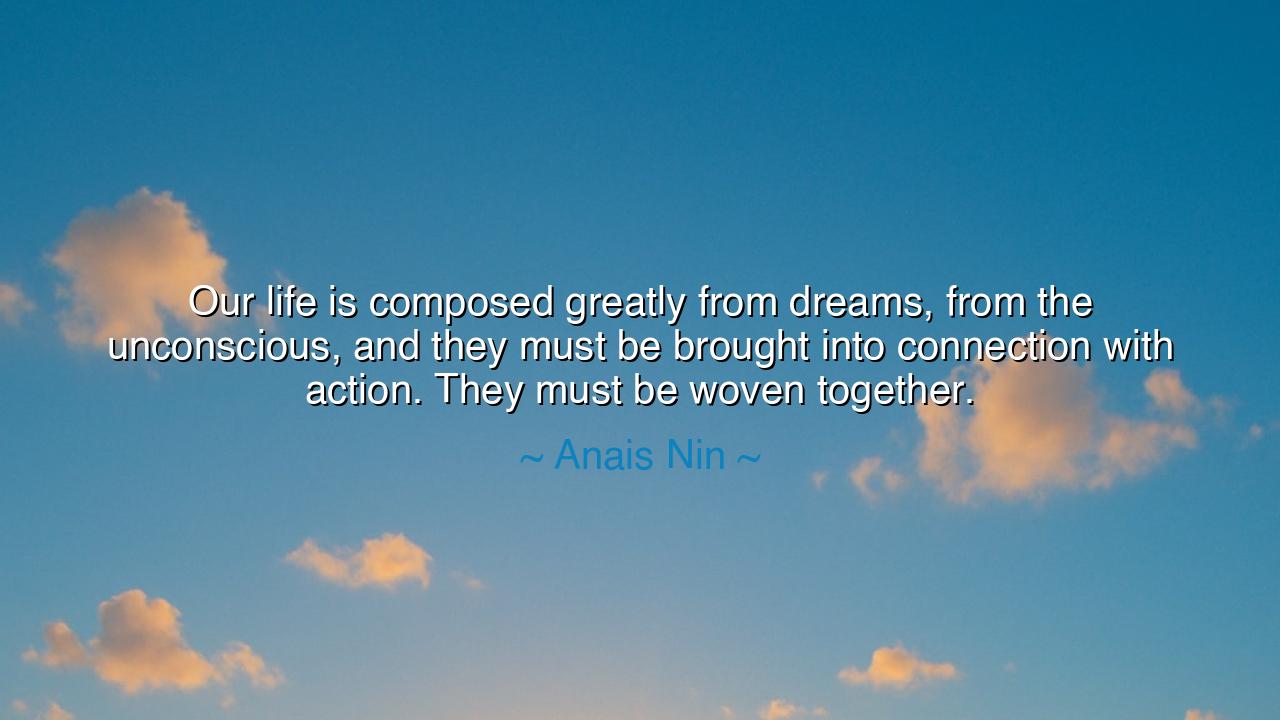
Our life is composed greatly from dreams, from the unconscious
Our life is composed greatly from dreams, from the unconscious, and they must be brought into connection with action. They must be woven together.






In the words of Anais Nin, "Our life is composed greatly from dreams, from the unconscious, and they must be brought into connection with action. They must be woven together," we hear a profound truth about the relationship between the inner workings of the mind and the outward expression of those dreams. Nin speaks to the power of the unconscious mind—that deep, often hidden part of our psyche that holds our desires, fears, and aspirations—and the necessity of connecting these dreams with the physical world through action. Dreams are not meant to remain as mere fantasies or fleeting thoughts, but are meant to be woven into the fabric of our everyday lives, shaping our realities and guiding us toward our true purpose.
This idea is echoed throughout the teachings of the ancient philosophers. Plato, in his discussions of the soul and its journey, believed that the soul was constantly in pursuit of truth, often through dreams and visions. But he also emphasized that the soul’s ultimate fulfillment lies not just in the contemplation of the ideal but in the action taken to align the world of the spirit with the world of the body. Similarly, Aristotle believed that the pursuit of virtue was not a passive endeavor but one that required deliberate and purposeful action. Both philosophers understood that life’s greatest purpose lies in the ability to bridge the ideal with the real, the inner world of dreams with the outer world of action.
Consider the life of Michelangelo, who dreamed not only of creating art but of transforming the very way humanity experienced beauty. His dream was not simply an unconscious fantasy but a vision that he actively worked toward. His David and the ceiling of the Sistine Chapel were not mere expressions of artistic talent; they were the physical manifestation of his dreams, dreams that connected his inner visions to the world. Michelangelo’s dreams were woven into his actions, as he dedicated countless years of his life to shaping his vision with his own hands. His life is a testament to Nin’s wisdom: that dreams, when connected with action, become a force capable of transforming the world.
Nin’s words also suggest that to live fully, one must acknowledge the influence of the unconscious mind. The unconscious is not a passive reservoir of idle thoughts, but a wellspring of insight, intuition, and untapped creativity. The unconscious speaks through our dreams, through our deepest desires, and through the silences that sometimes guide our decisions. Yet, too often, we neglect this rich source of wisdom, dismissing it as irrelevant or unimportant. The ancients understood the power of the unconscious. Carl Jung, a more modern thinker, built on the work of the ancients by recognizing the importance of the unconscious in shaping our identity and actions. He believed that by integrating the wisdom of the unconscious with our conscious actions, we could achieve a deeper sense of wholeness and purpose.
The lesson here is clear: dreams are not meant to stay locked in the unconscious or in our fantasies. They must be woven into our lives through action. The dreamer is not passive, nor should they wait for their visions to be handed to them on a silver platter. Rather, they must work to bring their inner visions into the world through deliberate effort and engagement. Just as Plato taught that knowledge without action is incomplete, Nin reminds us that dreams without action are nothing more than fleeting moments. Action is the bridge that transforms the intangible into the tangible, the imagined into the real.
In our own lives, we must ask ourselves: What are our dreams? What part of our unconscious selves has been calling out for expression? To live a life of fulfillment, we must take those dreams seriously—not as abstract ideas but as blueprints for the future. Every vision that has been planted in our hearts holds the potential to shape our reality, but only if we are willing to engage with it through action. As Nin suggests, we must actively weave our dreams into our daily lives, not waiting for the perfect moment, but creating it through our decisions and actions.
Thus, the practical action we must take is to connect with our dreams and the wisdom of our unconscious mind. Let us document our dreams, make them tangible, and break them down into steps we can take every day. Let us not dismiss the visions we have for our lives, but treat them as the raw materials from which we build our future. Like Michelangelo, who worked tirelessly to transform his dreams into masterpieces, we too must engage in the process of creation, using action to shape our dreams into something real, something lasting, something that will transform not only our lives but the lives of those around us.






AAdministratorAdministrator
Welcome, honored guests. Please leave a comment, we will respond soon